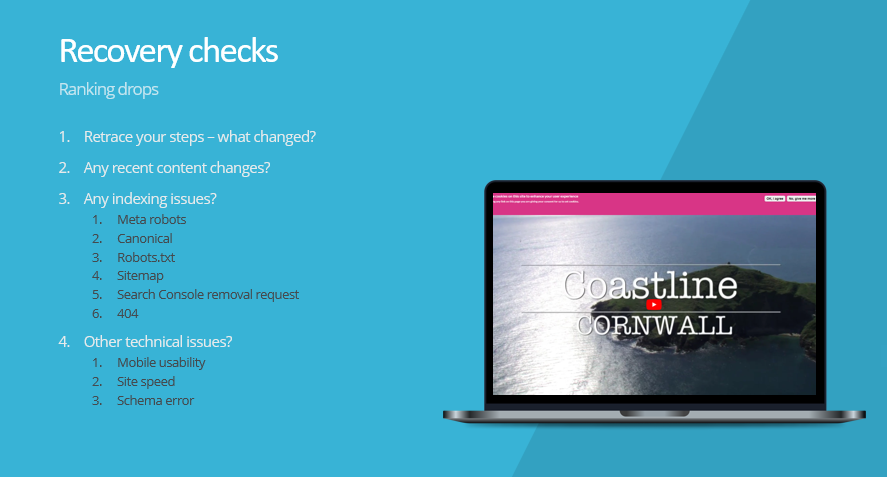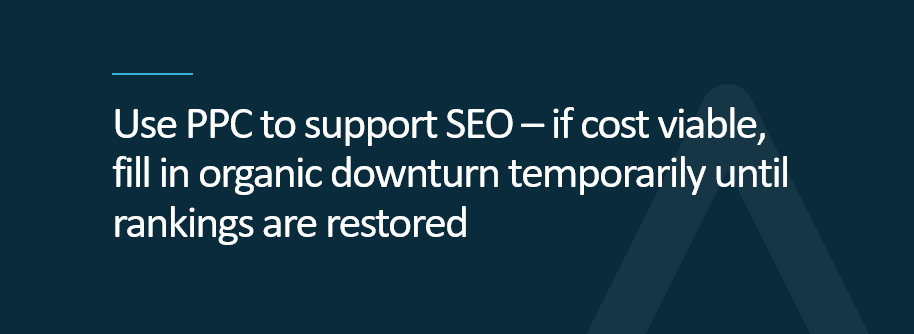Discover how we investigate issues within your SEO and PPC activity which might be affecting your performance with rankings, leads and conversions.
This article is part of a triology from Adido's Head of SEO, Tom Crewe, and Head of Paid Media, David Berendt who have been sharing lots of advice about how these two digital channels can work together to help you to meet your objectives and maximise results.
Part one of our series covered ‘How SEO & PPC can work in harmony for search success’
Part two discussed ‘How to be agile and reactive with your PPC and SEO activity’
How we investigate your SEO activity to measure it's effectiveness
- The first step is to ensure you have categorised your keyword targeting to enable a structured approach to analysis, and to highlight trends against themes rather than just individual search terms - normally these are clustered by page. Within the keyword ranking tool (we like to use Semrush) we apply tags to keyword clusters to make searching by groups easier.
- In clustering keyword themes it's easier to notice if there is a theme issue that needs to be addressed, versus just one/two individual terms fluctuating in the search rankings (which can easily happen). It's a universal category drop that should raise concern, and is more urgent to fix compared to a single fluctuating keyword (unless you rely heavily on that term).
That being said, ranking fluctuations mean very little if they don't impact your website performance.
- The next step is to understand how ranking performance affects landing page sessions and subsequently conversion performance. When setting up a search strategy you should always know which keywords should rank against which landing pages. By comparing ranking performance by keyword cluster against the landing page assigned to rank for these terms, we discover how significantly the two are impacted by one another. In addition to this, by applying granular keyword clusters and having highly refined landing pages for specific themes it can be easier to pinpoint troublesome areas that need attention.
- Before raising the alarm, it is important to review niche search categories against high-level generic ones (e.g. dog friendly st ives holidays vs. dog friendly holidays) to ensure that it's not a site wide issue against a generic category, but solely a niche keyword / landing page problem.
- If there are noticeable ranking drops, the next step is to evaluate whether this has impacted your traffic levels and/or conversion performance. If these are also declining that is when action needs to be taken as a matter of priority.
How to take action if your rankings have dropped
The following recovery steps help us to ensure that there isn’t an issue on your website that’s causing any ranking drops as opposed to competitor pressure or a weakening of relevancy.
Although rankings constantly fluctuate (potentially due to Google Algorithm updates, such as the most recent Core Web Vitals update), it’s always worth investigating if a keyword category / page has started to fall away.
Here are a few things we also look at to check that there isn't an issue on your website:
- We trace back and look at what has happened on the site recently to ensure this isn't the root cause
- We look at any changes made to your content to determine whether it's altered its relevancy and strength
If that doesn’t provide any answers, we will start looking at any indexing issues.
- We will look at lots of technical areas including your meta robots, canonicals, txt, your sitemap and check there's no 404 errors.
- We’ll also ensure that no one has made a removal request in the search console!
These are the areas that can really affect indexing; so after we have checked all of these, we can rule out that the ranking drop is due to an indexing issue.

Then we look at other technical issues to try and uncover and fix any problems, including:
- Issues that might be occurring with mobile usability which is a big ranking factor for Google
- Website page speed
- Any errors in your schema
If we still can’t find the issue, then we will suggest optimising your pages in a more effective way.
But, whilst our SEO team work on a recovery plan for your rankings, our PPC team can take over to get your traffic and conversions moving again.
How PPC can assist in a ranking recovery period
For a more in-depth look at this, click to read the second article in this series: How to be agile and reactive with your PPC and SEO activity.
This is what our PPC team concentrate on:
- What are the keywords where the rankings have dropped?
- If we are currently bidding on these, what is the competitive landscape doing?
- Is there volume worth chasing from a paid point of view?
- What costs are involved in buying this traffic? Is it affordable?
During this time, our PPC team can also learn quickly from the data and implement A/B testing of ads and landing pages for future decision making. This insight gathering and testing is more challenging to achieve via organic, so the team would make sure they’re gleaning as much information as possible to add value to your PPC spend.
Any keyword level insights from your PPC data (especially during the recovery period) is passed on to the SEO team so that they can consider it's impact on their SEO strategy moving forwards. Up to date, live data is always extremely valuable.

Other factors which may help with recovery
During a period of turmoil it's always worth revisiting the basics, sometimes they can easily get overlooked and taken for granted, but it's important to take a look with a fresh pair of eyes:
- Is there a focused call to action on the landing page - do site visitors really know what to do next?
- How trustworthy does your site look and feel? It's likely that consumers will have choice, with many businesses offering similar products and offerings, so it's important you have the right signals to win their confidence
- Keep your content simple. Let customers know exactly what you’re offering, why you’re the best choice and what they should do to get in touch/convert
- Always have one eye on the competition. We take a keen interest in what others are doing, especially if it seems successful, in order to develop a competitive strategy and come out on top!
If all of these things still don't have the desired effect, then it's time to go deeper with your landing page optimisation and overall keyword strategy.
If you're keen to hear from the experts themselves, you can watch the full video from Tom and David below:




